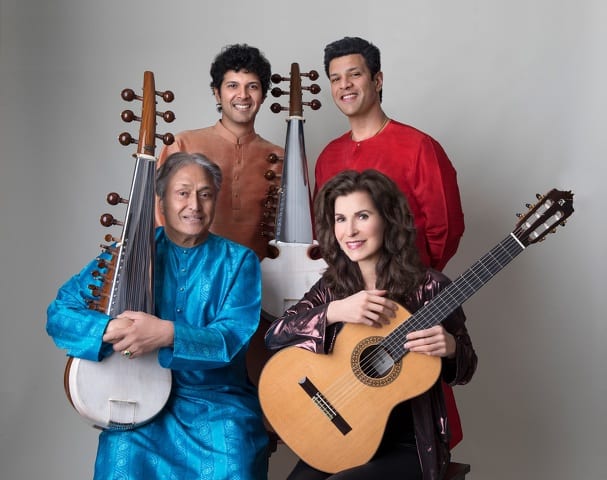Classical stringed instruments that don’t often share a stage will mesh when American guitarist Sharon Isbin, Musical America’s 2020 Instrumentalist of the Year, and Indian sarod maestro and composer Amjad Ali Khan perform Strings for Peace September 30 at Penn State’s Schwab Auditorium.
They’ll be joined by Khan’s sons, Amaan Ali Bangash and Ayaan Ali Bangash, who are also renowned in India and beyond for their sarod virtuosity.
“The idea is to achieve a cross-fertilization at both the cellular and cosmic levels of two classical music traditions, which are often held to be radically different,” Khan writes. “This is a blissful dream of a project, infused with the unique amalgamated contributions of artists united under a common aegis, regardless of their diverse backgrounds, cultures, traditions, generations, genders, religions, upbringing, and career paths.”
This meeting of East and West is anything but easy. While they’re both stringed instruments, guitar and sarod produce decidedly different sounds and are played in separate ways.
“You have the metal strings of the sarod being played with the plectrum, and the nylon strings of the guitar being played by the fingertips and fingernails,” Isbin says in an interview with India’s Hindustan Times. “It was intriguing to watch Ayaan and Amaan use the long fingernails on their left hands to produce pitches on the sarod, with a coconut shell as a plectrum in the right hand, whereas I have frets on the guitar for pitches and use long fingernails on my right hand to strike the strings.”
Director of guitar studies at The Juilliard School, Isbin has recorded more than 30 albums of music ranging from Baroque and Spanish/Latin to crossover and jazz-fusion. The multiple Grammy Award-winner has also commissioned a number of works to broaden the canon. A writer for the Atlanta Journal-Constitution calls the Minneapolis native “the Monet of the classical guitar … a master colorist.”
“Indian classical music has long pieces. You are taken on a journey. It is a very expansive state of consciousness, whereas a Bach or a Beethoven piece has a clear and defined sense of enclosure,” Isbin tells the Hindustan Times. “But I always found Indian classical music very meditative. I think I connected with it also because I have studied transcendental meditation and have been practicing it since I was a teenager.”
Khan, who gave his first sarod recital when he was 6, was born into the illustrious Bangash lineage of classical musicians. He is revered in India and celebrated around the world for bringing a new sensibility to sarod music while respecting its timelessness.
“There is no essential difference between classical and popular music,” he says. “Music is music. I want to communicate with the listener who finds Indian classical music remote.”
“The music Amjad Ali Khan has composed for guitar and sarod is sheer genius, and I don’t use this term lightly,” Isbin writes about Strings for Peace. “In an amazing way, it interweaves our varied musical, spiritual, and artistic traditions with mystical beauty, creativity, grace, and great emotion.”
Tickets for 2020–21 presentations are scheduled to go on sale in July at cpa.psu.edu.
John Mark Rafacz is the editorial manager of the Center for the Performing Arts.



